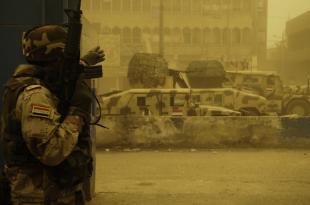|
|
|
An Iraqi army soldier from the 42nd Brigade, 11th Iraqi Army Division takes cover and points to where his men need to go during a firefight against armed militiamen in the Sadr City district of Baghdad April 17. (US Air Force photo/Technical Sergeant Adrian Cadiz) |
The showdown with the Mahdi Army continues in Baghdad and outlying areas to the North as Iraq’s prime minister says the days of the militias are over. US and Iraqi forces engaged the Mahdi Army in Baghdad and the towns of Rashidiyah and Hussaniyah in northern Baghdad Province over the past several days, killing 16 Mahdi Army fighters and capturing five. Seventy-two Mahdi Army fighters have been killed in Baghdad since Muqtada al Sadr threatened to initiate a third uprising.
The largest clash occurred in Hussaniyah, a town north of Baghdad, on April 22 when an Iraqi patrol was ambushed by a “criminal group” armed with roadside bombs, rocket-propelled grenades, and small arms. Iraqi troops, backed by US Special Forces advisers, counterattacked and killed nine Mahdi Army fighters and destroyed two of their vehicles.
Hussaniyah has been a hotbed of Mahdi Army activity in the recent past. In August 2007, US troops surrounded the town after patrols were ambushed. In October, US troops uncovered a weapons factory where explosively formed penetrators and other roadside bombs were manufactured.
In Baghdad, US forces killed three Mahdi Army fighters in a series of separate strikes by unmanned aerial vehicles. The strikes began late Wednesday night and ended early Thursday morning. Three Mahdi Army fighters were killed as they were planting roadside bombs inside Sadr City.
In Rashidiyah, a town northeast of Baghdad that straddles the Tigris River, Coalition special operations forces killed four “Iranian-trained Special Groups criminals” and detained five during an intelligence-driven raid. “Intelligence sources led Coalition forces to the location of an Iranian-trained Special Groups criminal suspected of receiving weapons and finances from Iran in order to lead attacks against Coalition forces,” Multinational Forces Iraq stated in a press release. “He is also suspected of directing and conducting kidnappings and sectarian violence against Iraqi citizens.” The Special Groups leader was among those captured.
South of Baghdad, Iraqi forces captured a Mahdi Army leader and two others and seized an IED factory in Karbala. US forces also found 12 Iranian-made rocket launchers, which were aimed at a nearby forward operating base.
Mahdi Army in the crosshairs
The US has killed 72 Mahdi Army fighters since Sadr threatened to cancel a self-imposed cease-fire and reignite a new uprising against the Iraqi government. The US military has made an effort to separate the Mahdi Army from what it labeled as “criminals” and Special groups in an attempt to lure Sadr back into the political process, court the more moderate elements of the Mahdi Army, and create divisions among the leadership and rank-and-file.
The US military has slowly begun to stop making distinctions between the Mahdi Army and the Criminals and Iranian-trained Special Groups as the fighting has flared since March. Colonel Allen Batschelet, the chief of staff for Multinational Division Baghdad, came closest to admitting the distinctions are often meaningless.
“[The Mahdi Army and the Special Groups] are so amorphous; they go back and forth between one another,” Batschelet said in a briefing with The New York Times. “We see evidence of a guy who might be working very hard inside [the Mahdi Army] to present himself as a mainstream, kind of compliant person. Yet we have other indicators that will show him kind of working the night job doing special group, criminal kind of stuff.”
For more information on the Special Groups and Iran’s role in the Iraqi insurgency, see Iran’s Ramazan Corps and the ratlines into Iraq and Targeting the Iranian “Secret Cells.” For more information on the Mahdi Army, see Sadr calls for Mahdi Army cease-fire and Dividing the Mahdi Army.









1 Comment
Great News!
Long Live a FREE Iraq